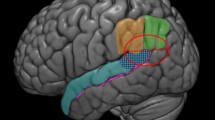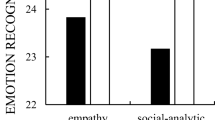Abstract
A phenomenological insight in the debate on empathy is that it is possible to directly perceive other people’s emotions in their expressive bodily behaviour. Contrary to what is suggested by many phenomenologists, namely that this perceptual skill is immediately available if one has vision, this paper argues that the perceptual skill for empathy is acquired. Such a skill requires that we have undergone certain emotional experiences ourselves and that we have had the experience of seeing the world differently, which is a form of pretence. By investigating how we retain knowledge of what is real while pretending, that is, how we anchor the experience of pretence in something that is not pretended, the paper argues that we split our experiential perspective into a double perspective, which differs from the cognitive act of understanding what a perspective is. With this notion in hand, we can return to the debate on empathy. It is argued that in order to have the capacity for direct empathic perception, one must have undergone experiences involving a double perspective.
Similar content being viewed by others
Notes
Here it might help to think of the difference between pretending and mimicking: an actor can thus play a character without pretending to be him. To pretend to be Churchill comes with a voluntary act of decentring and with one’s own pretend kind of behaviour, whereas mimicking is guided by someone else’s actions or behaviour.
References
Currie G (1998) Pretence, pretending and metarepresenting. Mind Lang 13(1):33–55
Currie G (2006) Rationality, decentring, and the evidence for pretence in non-human animals. In: Hurley S, Nudds M (eds) Rational animals?. Oxford University Press, Oxford
Currie G (2010) Narratives and narrators. A philosophy of stories. Oxford University Press, Oxford
Currie G, Ravencroft I (2002) Recreative minds. Imagination in Philosophy and Psychology. Clarendon Press, Oxford
De Jaegher H, di Paolo E (2007) Enactive intersubjectivity: participatory sense-making and mutual incorporation. Phenomenol Cognit Sci 6(4):485–507
De Jaegher H, di Paolo E, Gallagher S (2010) Can social interaction constitute social cognition. Trends Cognit Sci 14(10):441–447
Fuchs T, De Jaegher H (2009) Enactive intersubjectivity: participatory sense-making and mutual incorporation. Phenomenol Cognit Sci 8:465–486
Gallagher S (2001) The practice of mind: theory, simulation or primary interaction? J Conscious Stud 8(5–7):83–108
Gallagher S (2005) How the body shapes the mind. Clarendon Press, Oxford
Gallagher S (2008) Inference or interaction: social cognition without precursors. Philos Explor 11(3):163–174
Gallagher S, Hutto D (2008) Understanding others through primary interaction and narrative practice. In: Zlatev J, Racine T, Sinha C, Itkonen E (eds) The shared mind: perspective on intersubjectivity. John Benhamins, Amsterdam
Gallagher S, Zahavi D (2008) The phenomenological mind. An introduction to philosophy of mind and cognitive science. Routledge, New York
Harris PL (2000) The work of the imagination. Blackwell Publishers, Oxford
Heidegger M (1993) Sein und Zeit. Max Niemeyer Verlag, Tübingen
Heidegger, M (2004) Die Grundbegriffe der Metaphysik. Welt – Endlichkeit – Einsamkeit, Klostermann Seminar Ausgabe/Gesamt Ausgabe Band 29/30, Frankfurt am Main: Vittorio Klostermann
Leslie A (1987) Pretense and representation: the origins of ‘theory of mind’. Psychol Rev 94(4):412–426
Leslie A (2000) ‘Theory of mind’ as a mechanism of selective attention. In: Gazzaniga M (ed) The new cognitive neurosciences. MIT Press, Cambridge
Merleau-Ponty M (1962) The phenomenology of perception. Routledge, London
Michael J (2011) Interactionism and mindreading. Rev Philos Psychol 2:559–578
Nichols S, Stich SP (2000) A cognitive theory of pretence. Cognition 74(2):115–147
Nichols S, Stich SP (2003) Mindreading. An integrated account of pretence, self-awareness, and understanding other minds. Clarendon Press, Oxford
Perner J (1991) Understanding the representational mind. MIT Press, Cambridge
Perner J, Brandl JL, Garnham A (2003) What is a perspective problem? developmental issues in belief ascription and dual identity. Facta Philosophica 5:355–378
Ratcliffe M (2012) Phenomenology as a form of empathy. Inquiry 5(55):473–495
Reddy V (2008) Do Infants know minds?. Harvard University Press, Cambridge
Scheler M (1973) Wesen und Formen der Sympathie. Francke Verlag, Bern
Spaulding S (2010) Embodied cognition and mindreading. Mind Lang 25(1):119–140
Zahavi D (2005) Subjectivity and selfhood. Investigating the first-person perspective. MIT Press, Cambridge
Zahavi D (2008) Simulation, projection and empathy. Conscious Cognit 17(2):514–522
Acknowledgments
I am grateful for the questions and helpful comments made by two anonymous reviewers. Further, I am indebted to the following for their valuable comments and suggestions on earlier versions of the paper: Johan Gersel, Dorothée Legrand, Dylan Trigg, Thomas Schwarz Wentzer, Kasper Lysemose, Rasmus Dyring and the research group for Philosophical Hermeneutics at Aarhus University. Finally, this research is funded by The Danish Council for Independent Research supporting the research project “Existential Anthropology: Inquiring Human Responsiveness” at Aarhus University.
Author information
Authors and Affiliations
Corresponding author
Rights and permissions
About this article
Cite this article
Ingerslev, L.R. Why the Capacity to Pretend Matters for Empathy. Topoi 33, 201–213 (2014). https://doi.org/10.1007/s11245-013-9202-y
Published:
Issue Date:
DOI: https://doi.org/10.1007/s11245-013-9202-y




